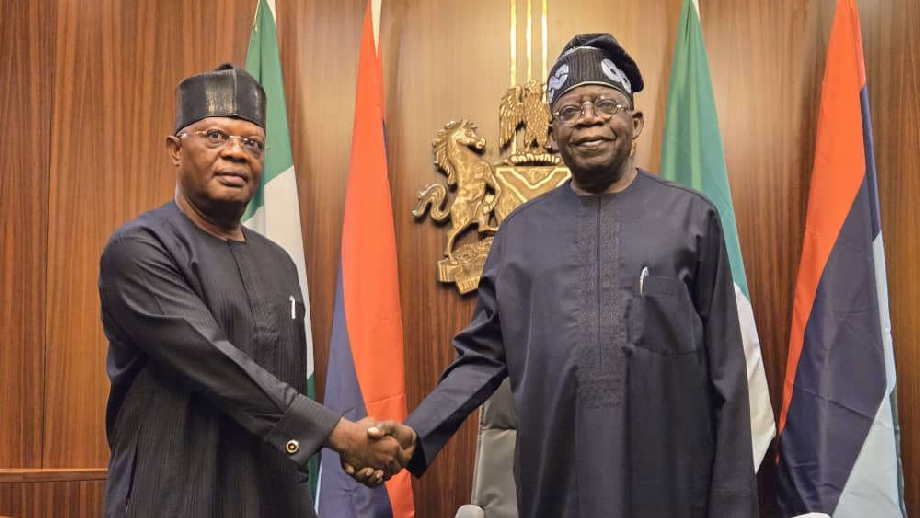
It has been two weeks since President Bola Tinubu appointed Vice-Admiral Ibok Ibas (retired) as the Sole Administrator of Rivers State following the declaration of a state of emergency in the state.
Following the suspension of Governor Siminalayi Fubara, his deputy, and the State House of Assembly, this move continues to generate strong reactions from various sectors of society.
The state of emergency, proclaimed under Section 305 of Nigeria’s Constitution, was ratified by the National Assembly despite significant opposition from political analysts, activists, and legal experts. Critics argue that the constitutional requirements for such a declaration, especially the breakdown of public order and safety, were not sufficiently met in Rivers State before the President's action.
Despite the debate over the legalities, the Sole Administrator took office with the mandate to restore law and order, stabilize the political environment, and prepare for the full restoration of democratic governance. Ibas emphasized that he would not act as a partisan figure but as a servant of the state, committed to moving Rivers forward and reclaiming its status as Nigeria’s oil and gas capital.
Early Actions and Decisions
In his first two weeks, Ibas has made several key decisions, including appointing a Secretary to the State Government, suspending all political appointees from the previous administration, and paying the March salaries of state government employees. He also inspected ongoing state government projects and ordered the suspension of all contract approvals and executions by Ministries, Departments, and Agencies (MDAs).
While these actions indicate a level of administration, they have not been without controversy. Critics argue that Ibas's decisions may be indicative of power consolidation rather than effective governance. There are also unconfirmed rumors that the former local government chairmen appointed under the Fubara administration may be reappointed as sole administrators for the 23 local councils, further heightening political uncertainty in the state.
Mixed Reactions from Workers and Civil Society
Civil servants in the state have expressed cautious optimism regarding Ibas’s leadership. Osumar Chucks, Chairman of the Nigeria Civil Service Union, Rivers State chapter, stated that workers are carrying out their duties but are waiting to see whether the Sole Administrator will fulfill the promises made by the suspended Governor Fubara regarding civil service welfare. In the words of Mr. Chuks: "We are hoping the sole administrator will call labour leaders and have a meeting with them."
"The governor promised us several things, among all was the contributory pension which was supposed to have commenced in June. The new administrator is there. I hope he is going to do it," he concluded.
On the other hand, Karl Chinedu, leader of the Civil Liberty Organization in the South-South region, has been critical of Ibas’s tenure thus far. He stated that it is difficult to assess any tangible progress under the Sole Administrator’s leadership, as not much has changed since he assumed office. Mr. Chinedu also commented on the uncertainty surrounding the potential extension of the state of emergency, suggesting that the political situation in Rivers State will ultimately determine the outcome. According to him; "two weeks is not really too much except that he has gone round to visit project sites. It's a very tricky thin line to bring judgment on because nothing has really happened, nothing has changed."
The displeased human rights activist retorted, "We all know that prior to his coming there was no violence in the state, there was peace in the state. Perhaps I am sure that on coming to the state he has seen that he really doesn't have much to do here, for now it's a wait and see thing. It depends on the political mutilations that play. there was no need for him to come here."
Calls for Reversal of State of Emergency
As Ibas settles into his role, there have been ongoing calls for President Tinubu to reconsider the state of emergency declaration in Rivers State. The argument for a reversal is based on the contention that the conditions necessary for such a drastic measure were never present. While the President’s reliance on the Constitution may have been legally justified, the broader political implications remain unclear.
In conclusion, the first two weeks of the Sole Administrator’s tenure in Rivers State have been marked by a mix of cautious actions and political skepticism. With the six-month state of emergency period still in effect, many are watching closely to see whether Ibas can meet the expectations of restoring peace and order or if his tenure will only deepen the political and governance crisis in the state. The coming weeks will likely be pivotal in determining the future of Rivers State under this extraordinary governance arrangement. Still on the declaration of a state of emergency rule in Rivers State.
Political Crisis in Rivers State: Concerns Grow Over Possible Extension of State of Emergency
There are increasing concerns among analysts and political figures regarding the ongoing political crisis in Rivers State, with fears that President Bola Tinubu might extend the state of emergency rule beyond its initial six-month period. These concerns are rooted in the unresolved differences between the camps of the Federal Capital Territory (FCT) Minister and Governor Siminalayi Fubara, which have recently been marked by allegations and counter-allegations.
A Lagos-based political analyst, Liborous Oshoma expressed his apprehension about the situation. While he acknowledged that it may be too early to rule out a resolution between the two camps, Oshoma emphasized the need for swift action. He warned that if the political deadlock persists, the state could be deprived of another round of democratic governance. His comments underline the urgency of finding a solution to the political impasse before the expiration of the state of emergency. Anything can happen between now and even next week.
In these exact words he made his comments: "This president, we can only shout o, I do not see him backing down on the steps they have taken already. They have done it and the heavens did not fall and if the party continues the way they are barking at each other, certainly they will still do it and then deploy people to justify the extension the worrying parties have to be very careful." Mr. Oshoma also called on the National Assembly to act quickly in setting up a reconciliatory committee to help mediate the peace process in the state. He believes that this could provide a pathway to resolving the crisis and ensuring the restoration of democratic governance in Rivers.
Meanwhile, Achineke Williams-Wobodo, a Port Harcourt-based lawyer, echoed similar concerns. Williams-Wobodo feared that political hostility could resume after the expiration of the state of emergency if the issues remained unresolved. He further urged both the suspended governor and lawmakers to seek an amicable settlement to avoid prolonged instability.
These were the exact words of the lawyer during the interview: "Is political opportunities and reverse that can give a lasting amicable solution to the situation we have on the ground, the governor and his deputy governor, so the suspension merely put those things in ambiance it did not terminate them." In response to public concerns about the sole administrator's management of state funds, Williams-Wobodo suggested that accountability measures should be pursued through the National Assembly. This, he argued, would help ensure transparency and alleviate fears regarding the state’s administration during this period of emergency rule.
In this regards he has this say: "Nothing will happen to the funds I want to presume so but it does not mean that the sole administrator is not accountable. The sole administrator is accountable to the presidents, so the resources of River State is accountable to the president and the president is accountable to the National Assembly as it relates to the funds."
Former Commissioner for Information and Communications in Rivers State, Obonna Nwuke, also weighed in on the matter. He appealed to President Tinubu to listen to the voices of Nigerians and restore democratic rule in Rivers State. Nwuke’s statement reflects the growing frustration among the public, who are eager for a return to democratic governance.
These were Mr. Nwuke's words when called for the reversal of the state of emergency rule in Rivers State: "People have been given the opportunity to ventilate their positions as the constitution allows but what we are talking about at this point is some level of reasonability. The issue that most Nigerians are calling for is that it is time to suspend the state of emergency. So this point should be the major take home for Mr president to sustain our democracy."
As the state of emergency rule nears its expiration, there is mounting pressure on political leaders in Rivers State to resolve their differences and restore stability. The hope is that swift action will prevent the need for further extensions and pave the way for democratic governance to be reinstated.


